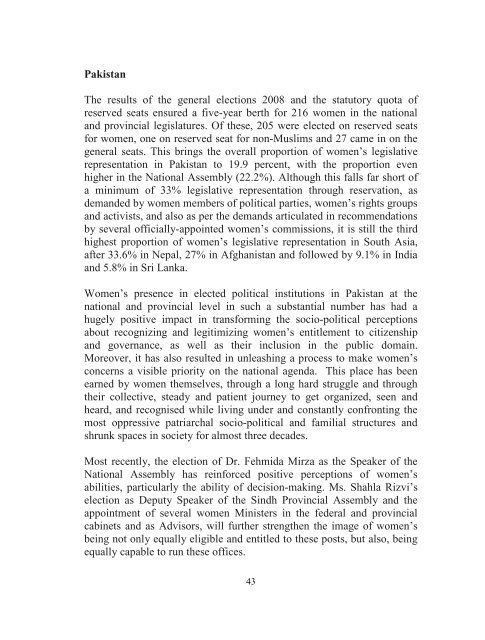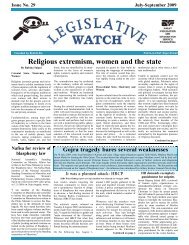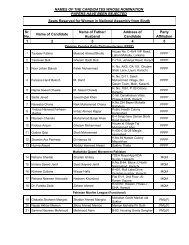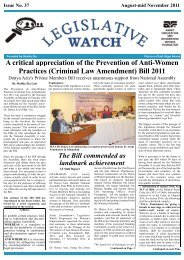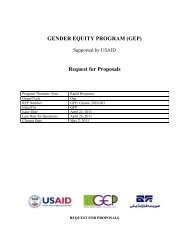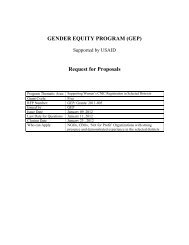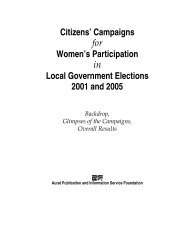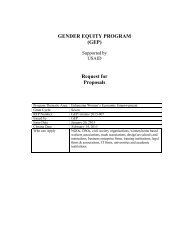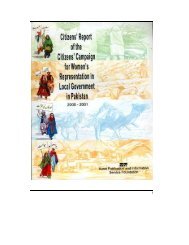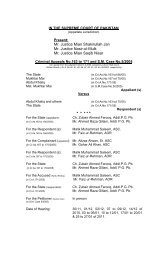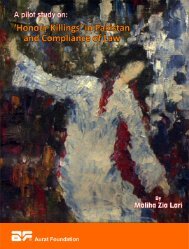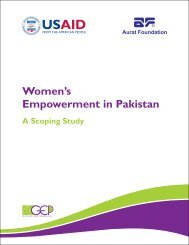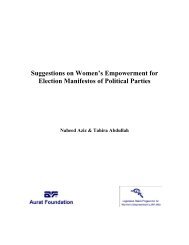Legislative Quotas for Women: A global and ... - Aurat Foundation
Legislative Quotas for Women: A global and ... - Aurat Foundation
Legislative Quotas for Women: A global and ... - Aurat Foundation
- No tags were found...
Create successful ePaper yourself
Turn your PDF publications into a flip-book with our unique Google optimized e-Paper software.
PakistanThe results of the general elections 2008 <strong>and</strong> the statutory quota ofreserved seats ensured a five-year berth <strong>for</strong> 216 women in the national<strong>and</strong> provincial legislatures. Of these, 205 were elected on reserved seats<strong>for</strong> women, one on reserved seat <strong>for</strong> non-Muslims <strong>and</strong> 27 came in on thegeneral seats. This brings the overall proportion of women’s legislativerepresentation in Pakistan to 19.9 percent, with the proportion evenhigher in the National Assembly (22.2%). Although this falls far short ofa minimum of 33% legislative representation through reservation, asdem<strong>and</strong>ed by women members of political parties, women’s rights groups<strong>and</strong> activists, <strong>and</strong> also as per the dem<strong>and</strong>s articulated in recommendationsby several officially-appointed women’s commissions, it is still the thirdhighest proportion of women’s legislative representation in South Asia,after 33.6% in Nepal, 27% in Afghanistan <strong>and</strong> followed by 9.1% in India<strong>and</strong> 5.8% in Sri Lanka.<strong>Women</strong>’s presence in elected political institutions in Pakistan at thenational <strong>and</strong> provincial level in such a substantial number has had ahugely positive impact in trans<strong>for</strong>ming the socio-political perceptionsabout recognizing <strong>and</strong> legitimizing women’s entitlement to citizenship<strong>and</strong> governance, as well as their inclusion in the public domain.Moreover, it has also resulted in unleashing a process to make women’sconcerns a visible priority on the national agenda. This place has beenearned by women themselves, through a long hard struggle <strong>and</strong> throughtheir collective, steady <strong>and</strong> patient journey to get organized, seen <strong>and</strong>heard, <strong>and</strong> recognised while living under <strong>and</strong> constantly confronting themost oppressive patriarchal socio-political <strong>and</strong> familial structures <strong>and</strong>shrunk spaces in society <strong>for</strong> almost three decades.Most recently, the election of Dr. Fehmida Mirza as the Speaker of theNational Assembly has rein<strong>for</strong>ced positive perceptions of women’sabilities, particularly the ability of decision-making. Ms. Shahla Rizvi’selection as Deputy Speaker of the Sindh Provincial Assembly <strong>and</strong> theappointment of several women Ministers in the federal <strong>and</strong> provincialcabinets <strong>and</strong> as Advisors, will further strengthen the image of women’sbeing not only equally eligible <strong>and</strong> entitled to these posts, but also, beingequally capable to run these offices.43


